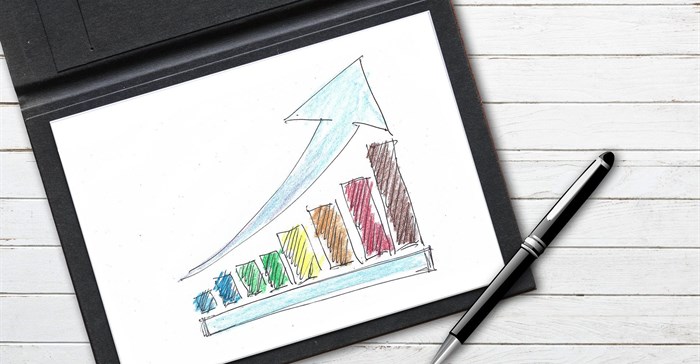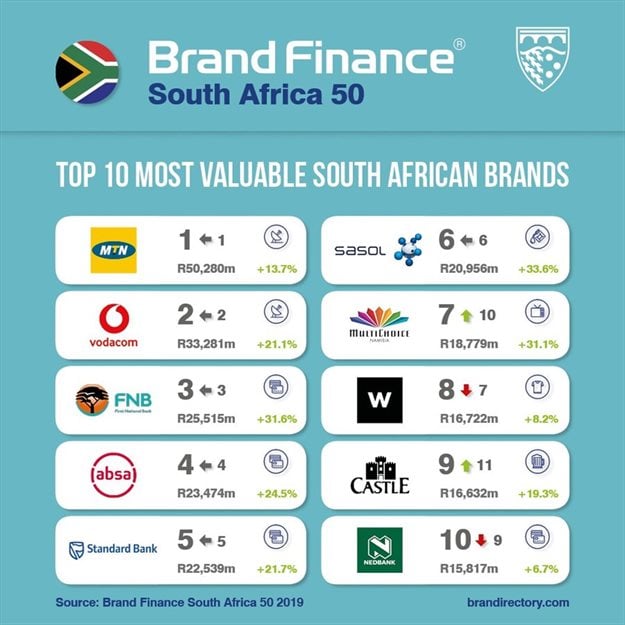
Related


Vitol joins consortium planning $3bn gas-fired power station at Durban port
Wendell Roelf 16 Feb 2026




Top stories






More news


Marketing & Media
Ads are coming to AI. Does that really have to be such a bad thing?














These brands are outpacing the country’s GDP, with the top 50 recording a 16.1% brand value growth rate year-on-year and the top 10 recording an impressive 19.8% growth rate year-on-year.
Jeremy Sampson, managing director, Brand Finance Africa, commented:
We can celebrate that the top South African brands are consistently recording high brand value growth rates, in stark contrast to the nation’s sick economy, which is currently falling short of other countries’ growth across the continent.
The impressive performance of South Africa’s most valuable brands poses a potential source of growth for the economy that, in turn, could lead to increased job creation and funds flowing to the fiscus.
Telecommunications brands, MTN and Vodacom, lead the way in the rankings claiming first and second position respectively.
Africa’s biggest telcos company, MTN (brand value up 15% to R50.3bn), has grown its subscriber level steadily over the last year and boosted revenue.
Vodacom’s brand value increased by 21% to R33.3bn, despite the brand recording revenue losses in its South African business. The strong results from Vodacom’s international operations and the benefits reaped from the 2017 Safaricom acquisition, however, have provided solid growth for the brand over the last year.
The MTN-Vodacom duopoly is continuously grappling for greater market share across the country, resulting in data price wars, and thus leaving smaller brands struggling to compete including, Telkom (up 15% to R5.9bn) and Cell C (up 5% to R3.9bn).
Although both brands have recorded modest growth compared with other brands across the ranking, they have achieved good results against the backdrop of falling telco brand values around the world, as they contend with the increased commoditisation of core carrier services and the need to implement new technologies requiring significant capital investment, such as the 5G mobile telephony.
The banking sector is the most valuable sector in the country with First National Bank, ABSA and Standard Bank completing the top 5.
FNB has sustained strong brand value growth after it broke into the top 3 last year, its brand value increasing a healthy 32% to R25.5bn. The bank’s retail division has expanded its customer base, extended its credit line to top clients and recorded high levels of transactions through its app, all demonstrating its defiance to the economic troubles in the country.
Following Barclays’ sale of its final stake in Absa in 2017, it has begun its return to the global banking marketplace. Absa (up 25% to R23.5bn) has opened offices in the US and UK in a bid to support growth on the continent, as more European businesses are looking towards Africa for investment amid Brexit uncertainty.
Standard Bank (up 22% to R22.5bn), sitting in 5th place, has delivered sustainable earnings growth, which the brand attributes to the strength and breadth of its client franchise.

Castle Lager, the nation beer of South Africa, has jumped into the top 10 for the first time, its brand value increasing 19% to R16.6bn. 100% grown and produced in the country, Castle is a much-loved drink at home in South Africa, as well abroad, sold in over 40 counties worldwide.
The brand continues to benefit from its multiple sports sponsorship partnerships and from successful marketing drives, most notably the #SmashTheLabel campaign, which encouraged South African’s to unite against discrimination.
Besides Castle, three further beer brands have entered the ranking for the first time: Carling Black Label (up 26% to R12.7bn); Hansa Pilsner (up 13% to R4.2bn); and Soweto Gold Superior (up 35% to R2.9bn). The latter a home-grown brand acquired by Heineken.
In contrast, healthcare brands have suffered across the board with MediClinic (down 50% to R5.8bn), Netcare (down 40% to R3.2bn) and Life Healthcare (down 17% to R1.9bn) recording high brand value losses. These three-hospital group brands have a combined market share of 83% of the national private facilities market and have therefore faced criticism that the sector is too concentrated.
Following the release of the Competition Commission’s Health Market Inquiry’s report, the sector has come under scrutiny for rising consumer costs and lack of transparency, both no doubt impacting brand values.
MediClinic, which has suffered the biggest knock to its brand value, has seen a dismal performance from its Swiss arm following regulatory changes in the country.
South Africa’s largest sugar producer, Tongaat Hulett, has dropped out of this year’s ranking, following an accounting scandal in which the brand is currently being investigated for overstating its 2018 results.
It was recently announced that Tongaat has withdrawn its listing on the stock exchange and 5,000 employees have been sent retrenchment letters.
This is not the first time a South African brand has hit the headlines for accounting fraud. In late 2017, it was uncovered that Steinhoff had recorded fictitious and irregular transactions, which substantially inflated the brand’s profits, and resulted in the brand’s market value wiping out and the CEO’s resignation.
Oil company, Engen, is the fastest-growing brand in South Africa, recording an impressive 67% rise in brand value to R6.7bn. In 2018, Engen built 15 new service stations across the country, a record for the brand, and partnered with doughnut giant Krispy Kreme to launch its new forecourts, part of the brand’s efforts to remain an attractive stop-over.
Clicks also boasts a significant rise in brand value, increasing 59% to R6.1bn. The retailer has committed to its expansion programme over the last year, and with dozens of new stores in the pipeline, the company shows no signs of slowing down as it aims to hit its 900-store target.
Discovery (up 58% to R13.1bn) is the nation’s largest health-insurance administrator and has seen major success through its Vitality rewards scheme which awards points for completing various online health assessments and routine medical checks.
In addition to measuring overall brand value, Brand Finance also evaluates the relative strength of brands, based on factors such as marketing investment, familiarity, loyalty, staff satisfaction, and corporate reputation. Alongside revenue forecasts, brand strength is a crucial driver of brand value.
According to these criteria, Discovery is the world’s second strongest insurance brand, behind China’s Ping An, with a Brand Strength Index (BSI) score of 86.0 out of 100 and a corresponding AAA brand strength rating and the 5th strongest in the nation.
Capitec (up 15% to R7.8bn) defends its position as South Africa’s strongest brand with a BSI score of 88.7 out of 100 and a corresponding AAA brand strength rating.
Since the bank’s inception nearly two decades ago, Capitec has disrupted the country’s financial services sector and traditional banks, through removing barriers to entry for everyday customers.
This approach has led to the brand boasting a vast customer base, with 44% of South Africans banking with them. This number is growing exponentially as more people turn to the brand for its reliability, transparency and reduced fees.
View the full Brand Finance South Africa 50 2019 report here.